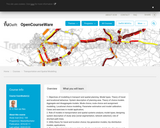
1. Objectives of modelling in transport and spatial planning. Model types. Theory of travel and locational behaviour. System description of planning area. Theory of choice models. Aggregate and disaggregate models. Mode choice, route choice and assignment modelling. Locational choice modelling. Parameter estimation and model calibration. Cases and exercises in model application; 2. Role of models in transportation and spatial systems analysis; model types; designing system description of study area (zonal segmentation, network selection); role of shortest path trees; 3. Utility theory for travel and location choice; trip generation models, trip distribution models; applications; 4. Theory of spatial interaction model; role of side constraints; distribution functions and their estimations; constructing base matrices and estimating OD-tables; 5. Theory of individual choice models; 6. Disaggregated choice models of the logit and probit type for time choice, mode choice, route choice and location choice; 7. Integrated models (sequential and simultaneous) for constructing OD-tables; 8. Equilibrium theory in networks and spatial systems; 9. Route choice and assignment; derivation of different model types (all-or-nothing model, multiple route model, (stochastic) equilibrium model); assignment in public transportation networks; analyses of effects; 10. Calibration of parameters and model validation; observation, estimation, validation; estimation methods; 11. Individual exercise computing travel demand in networks; getting familiar with software; computing all transportation modelling steps; analyse own planning scenarios; writing a report.Study Goals: 1. Insight in the function of mathematical models in transportation and spatial planning; 2. Knowledge of theoretical backgrounds of models; 3. Knowledge of application areas of models; 4. Ability to develop one's own plan of analysis for model computations; 5. Ability to apply models on planning problems; 6. Ability to present outcomes of model computations.
- Subject:
- Engineering
- Material Type:
- Full Course
- Provider:
- Delft University of Technology
- Provider Set:
- Delft University OpenCourseWare
- Author:
- R. van Nes
- Date Added:
- 02/11/2016
